WHEELS OF INDUSTRY.
Page 4
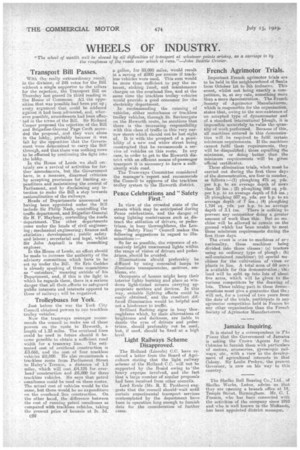
Page 5
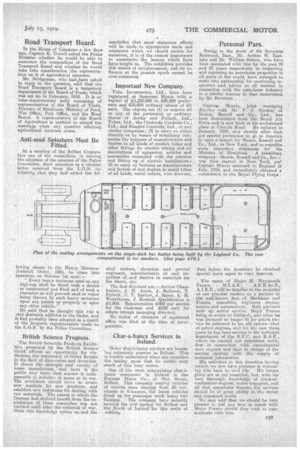
Page 6
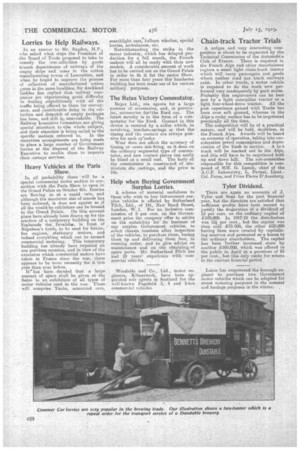
Page 7
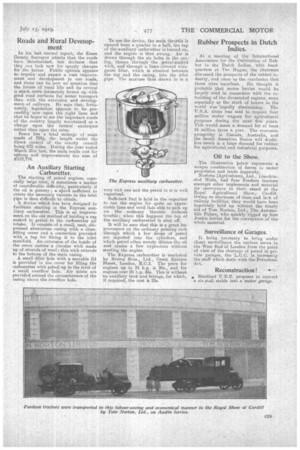
Page 8
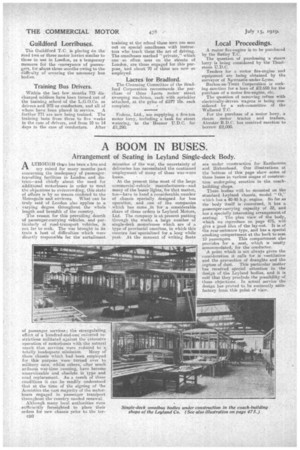
If you've noticed an error in this article please click here to report it so we can fix it.
The wheel of wealth will be slowed by all difficulties of transport at whatever ,points arising, as a carriage is by the roughness of the roads over which it runs."—John Beattie Crozier.
Transport Bill Passes.
With the really extraordinary result, in the division, of 245 votes for the Bill without a single supporter to the tellers for the rejection, the Transport Bill on Thursday last passed its third reading in the House of Commons. All the opposition that was possible had been put up; every, argument that could be adduced against it had been advanced, and, wherever possible, amendments had been, effected in the terms of the Bill. Sir Richard Cooper proposed the rejection of the Bill and Brigadier-General Page Croft seconded the proposal, and they were alone in the lobby, probably because it was felt by the opposition that the Govern, merit were determined to carry the Bill through, and that there was nothing more to be effected by continuing the fight into the lobby. In the Rouse of Lords we Shall certainly see a revival of activities for further amendments, but the Government have, in a measure, disarmed criticism by accepting provisions for limiting expenditure and maintaining the control of Parliament, and by disclaiming any intention to make the Bill a step towards nationalisation of the railways. . Heads of Departments announced as having been appointed under the Bill include Sir Philip Nash, controlling the traffic departmerst, and Brigadier-General Sir H. P. Maybury, controlling the roads department. • The other departments come under the heads of civil engineering; mechanical engineering; finance ana statistics ; development; public safety and labour ; secretarial and legal, whilst Sir John Aspivall is the consulting engineer. In the .House of Lords, an effort should be made to increase the authority of the advisory committees which have to be set up under the Bill. Sir Eric Geddes is already speaking of these committees as "outsiders meaning outside • of his Department, and, if this is the light in which he regards them, there is,a serious danger that all theireefforts to safeguard public interests and interests opposed to those of railway.; will be negatived,
Trolleybuses for York..
Just before the war the York City Council obtained powers to rile trackless trolley vehicles. Now the tramways manager recommends the council to make use of these powers on the reute to Heworth, length of L33 miles. The overhead lines could be need in future should it become possible to obtain a sufficient road width for a tramway line. The estimated oast of overhead construction is 23,668, and the cost of four trackless vehicles 2E3,000. He also recommends a trackless route from Parliament Street to Haley's Terrace, a distance of 1.5 miles, which will cost. 24,125 for overhead construction and 26,000 for three trackless vehicles. He says that petrol omnibuses couldbe used on these routes. The actual cost of vehicles would be the same, but there would be no expenditure on the overhead line construction. On the other hand, the difference between the cost of running petrol omnibuses as compared with trackless vehicles, taking the present price of benzole at 2s. 3d.
028 • a gallon, for 80,000 miles, would result in a saving of 2800 per annum if trackless vehicles were used. This siins would be more than sufficient •to pay the interest, sinking fund, and maintenance charges on the overhead, line, and at the same time the trackless trolley• vehicles would provide a good consumer for the electricity department;
In recommending the running of vehicles, either motorbuses or trackless trolley vehicles, through St. Saviourgate an the Heworth route, ho mentions that there is the increasing responsibility with this class of traffic) in this very narrow street which should not be lost eight of. It is with 'the prospect of a possibility of a new and, wider street being constructed that he recommends a service of vehicles on this route. In any case, in order to get to the Heworth district with an efficient means ofwassenger transport it is necessary to have a sufficiently wide road.
The Tramways Committee considered the manager's report and recommends the Council to approve of the trackless trolley systere to the Heworth district.
Peace Celebrations and "Safety First."
In view of the crowded state of the streets which may be anticipated during Peace celebrations, and the danger of using lighting contrivances such as distract the attention of drivers, or pedestrians, in busy thoroughfares, the London " Safety First" Council makes the following suggestions in regard to illuminations :— So far as possible, the exposure of excessively bright unsereened lights within the range of vision of drivers and pedesgrians„should be avoided.
Illuminations should preferably be diffused by using concealed lamps to illuminate transparencies, mottoes, emblems, etc.
Occupants of 'houses might keep their interior lights burning and place at windows light-tinted screens carrying appropriate mottoes and devices, In this way, suitable lighting effects could be easily obtained, and the reeultant diffused illumination would be helpful and nut a hindrance to traffic.
Brilliant flashing signs in busy 'thoroughfares which, by their alternations of brightness and darkness, are liable to dazzle the eyes of drivers and pedestrians, should preferably Pot be used, but, if used, Should be fixed at a high
Light Railways Scheme Disapproved.
The Holland (Lincoln) C.C. have received a letter from the Board of Agriculture stating that the light railway scheme of the Holland C.C. will not be supported by the Board owing to 'the. heavy expense involved, and the fact that a large number of similar proposals had been received from other ceetneiLs.
Lord Ernie (Mr. R. E. Prothero) suggests that the council should; wait until certain experimental transport services contemplated by the department have been in opeTation long enough to furnish data for the consideration of further cases.
French Agrimotor Trials.
, Important French agrimotor trials are to be held in the neighbourhood of Senlis from October 1st to 5th inclusive. This event, whilst not being exactly a competition, is, at any rate, something more than a mere demonstration. The French Society, of Agrimotor Manufacturers, which is responsible for the organization, states that, owing to the non-existence of an accepted type of dynamometer and of a standard international plough, it is impossible accurately to value the:quantity of work performed. Because of this, all machines entered in this demonstration will be required to fulfil certain minimum requirements. If the machine cannot fulfil these requirements, they will be. disqualified ; those equalling the minimum, or doing better than the minimum requirements will be given official certificates.
These elimination trials, wheh must be carried out during the first three days of the demonstration, are four in number, as follows :—(1) ploughing 476 sq. yds. per h.p. to, an average depth of more than 10 ins. ; (2) ploughing 598 sq. ycls• per h.p. to an average depth of 8.6 ins. ; (3) ploughing 837 sq. yds. per h.p. to an i average depth of 7 ins.; (4) ploughin.g 1,794 eq. yds. per h.p. to an average depth of .3.1 ins. There is nothing to prevent any competitor doing a, greater amount of work than this. But no machine will be allowed to remain on the ground which has "been unable to • meet -these minimum requirements during the first three days.
The event is or sir to machines of any nationality, these machines being divided into three classes: (a) tractors using an ordinary type of plough ; (b) self-contained machines; (c) special machines for the cultivation of vines or Plants in line. A total area of 69 acrcs is available for this demonstration; this land will he split up into lots of about five acres, which will be given to the various competitors by the drawing of lots. Those taking part in these denier:strations must give a guarantee that the; will not, for a period of two years from the date of the trials, participate in any agrimotor competitioti held in France by any other organization than the French Society of Agrimotor Manufacturers.
Jamaica Inquiring.
It is stated by a correspondent in Tits Times that the Government of Jamaica is asking the Crown -Agents for the Colonies to furnish them with _particulare of motors, accessories, gyroscopic railways, ate., With a view to the development of agricultural interests in that Colony. Sir Leslie Probyn, the present Governor, is now on his way to this country.
The Skefko Ball Bearing Co.:Ltd., of Skelko Works, -Luton, advise us that' they are opening a branch office at 14, Temple Street, Birmingham. Mr. G. I. Francis, who has been connected with the activities of the company since 1910 and who is well known in the Midlands, has been appointed district manager,
Road Transport Board.
In the House of Coinmons a .few days ago, Captain It Terrell asked the Prime Minister whether he would be able to announce the composition of the Road. Transport Board and whether he would take into consideration the representation on it of agricultural interests.
Mr. Bridgeman, who had been asked to reply to the question, said that the Road Transport Board is a temporary department of the Board of Trade, which was set up in February, 1918. It is an inter-departmental body consisting of representatives of the Board of Trade, • Ministry of Munitions, Ministry of Food, War Office, Post, Office, and the Road Board. A representative of the Board of Agriculture is entitled to attend the meetings when any question affecting agricultural interests arises.
Anti-mud Splashers Must Be Fitted.
At a meeting of the Belfast Corporation one of the councillors, in moving the adoption of the minutes of the Police Committee, drew attention to a circular letter received from the L.G.B. intimating that they had added the fol
lowing clause to the Heavy Motorcar (Ireland) Order, 1905, to come into operation on October lst next:— " Every heavy motorcar used on any highway shall be fitted with a device so constructed and fixed and of such a character as will prevent mud or water being thrown by such heavy motorcar upon any person or property or upon any other vehicle."
He said that he thought this was a • iery desirable addition to the Order, and it had probably been adopted as a result of the frequent representation made to the L.O.B. by the Police Committee.
British Science Progress.
The British Scientific Products Exhibition promoted by the British Science Guild affords an opportunity for vindicating the supremacy of Great Britain in the field of discoveries and invention. It shows the strength and variety of home manufacture, and from it the public may learn that science is indispensable to industry irf peace as in war. The exhibition should serve to create new markets for new products, and establish new industries for dealing with raw materials. The extent to which the German had derived henefit.from the exploitation of these researches was not realized until after the outbreak of war. With this ,knowledge before us. and the
conviction that most strenuous efforts will be Made to appropriate trade and commerce which we should secure for ourselves, it is of the utmost importance to accentuate the lessons which facts have taught us. The exhibition provides this means of enlightenment, and its influence at the present epoch cannot be over-estimated.
Important New Company.
. Tube Investments, Ltd., have been registered at Somerset House with a
• dapital of £1,250,000 in 625,000 preference and 625,000 ordinauy share Sof £1 each.: The objects are (1) to acquire all or any of the preference or ordinary shares of Accles and Pollock, Ltd., Tubes, Ltd., the Credenda Conduits Co., Ltd. and Simplex Conduits, Ltd., or any simdar, companies'; (2) to carry on either, directly or by means of subsidiary cornpanies the business of manufacturers and dealers in all kinds of conduit tubes and other fittings for electric 'wiring and all descriptions of apparatus, articles and accessories connected with the_ erection and fitting 'up of electric installations; (3) to carry on business as manufacturers and factors amid dealers in metal tubes of all kinds, metal rollers, wire drawers,
Steel makers, electrical and • general engineers, manufacturers of and importers of and dealers in materials for the above, etc.
The first directors are :—Arthur Chamberlain, J. H. Aston, J. Rollason T. Pollock, C. T. Barlow, J. Bauer, L. M. Waterhouse J. Kemnal. Qualification is £1,000. Re.muneration £400 per annum for the chairman and £250 each for others (except managing director).
No notice of situation of registered office was filed at the time of nicer, poration.
Char-a-bancs Services in Ireland.
Motor oharol-banes services are becoming, extremely popular in Belfast. This is readily understood when one considers the beauty spots that lie within easy reach of this busy centre.
One of the most enterprising char-abanes companies in Ireland is the Exprips Motor Co., of May Street, Belfast. This company employ vehicles of various sizes ranging from 50 cwt. chassis to 4-tonners,the latest vehicles fitted up for passenger work being two Ensigns. 'The company have .recently "secured the sole 'agency for Belfast and the, North of halan& for this make of veldelek.
Personal Pars.
Owing to the death of Sir BoYerton Redwood, Bart., Mr. Arthur W. Eastlake and Mr. William Sutton, who have been associated with him for the past 28 and 23 years respectively in inspecting and reporting on petroleum properties in all parts of the world, have arranged to enter into partnership' for continuing inspection and advice on all matters in connection with the petroleum industry in a similar manner to that undertaken by Sir Boverton, Captain Morris,• joint managing director with Mr. F. J. Gordon; of Morris,• Russell and Co., Ltd:, has been demobilized from the Royal Air Force and is now back at his accustomed place at Curtain Road. He enlisted in • January, 1916, 'and shortly after that got special permission to go to America to open a branch for Morris', Russell and Co., Ltd., in New York; and to expedite some important, shipments for the
Ministry of Mon itionS, A subsidiary company—Morris. Russell and Co., Inc.— was then started in New York, an Captain Morris returned to England in July, 1916, and immediately obtained a commission in the Royal Flying Corps Just before the Armistice -beobtained special leave again to visit ,America.
• The name of Major H. • Waymouth.
Prance, M.I.A.E., A:F.R.Ae.S4 A.I.E.E., will be familiar to -the majority of our prewar readers as a partner in the well-known firm of Markham and Prance, consulting engineers (motor, marine and aeronautical). Roth partnera took up active seevice, Major Prance being in,acticin in Gallipoli, and when he was declared no longer fit for active ser• • vice he returned to his old sphere—that of petrol engines; and for the past three years he has been serving in the technical. department of the R.F.C. and RAT., where he carried out important work, first in connection with experimental aero engines and then: in charge of the section dealing with the supply of technical information.
His activities in this direction having ceased, we now have pleasure in welcernl. ing him 'back to civil life. His future _plans are as yet' unsettled,but, with his very thorough knowledge of internalcombustion engines, motor transport, and all that appertains thereto, his services should be of great utility in th.: motor and transport world. We May add that, We should be very pleased to pui any firm in touch with Major Prance should they .wish to communicate with him.
Lorries to Help Railways.
In an answer to Mr. Sugden, M.P., who asked what steps the President of the hoard of Trade eroposed to take to remedy the non-collection by goods transit departments of railways of the empty skips and cages in the cotton manufacturing towns of Lancashire, and when he hoped to improve the process of collection of manufactured cotton. yarns in the same localities, Sir Auckland Geddes has replied that railway companies are experiencing great difficulty in dealing expeditiously with all the traffic being offered to them for conveyance, and conelderable delay in the collection and despatch of empty packages has been, and still is, unavoidable. The Railway Executive Committee are giving special attention, to *the whole subject, and their attaentlon is being called to the
specific matters referred °to. In the meantime arrangements are being made to place a large number of Government lorries at the disposal of the Railway Executive to enable them to improve their cartage services.
Heavy Vehicles at the Paris Show.
In all probability there will be a special commercial motor section in connection with the Paris Show. to open in the Grand Palitis on October 9th. Entries are flowing in at a rapid rate, and although the maximum size of stands has been reduced, it clues not appear as if all the would-be exhibitors can be.housed in the Grand Palau!. On this account plans have already been drawn up for the erection of a temporary building on the Esplanade des_ Invalid, in front of Napoleon's tomb, to be used for lorries,' fire engines, stationary motors, and indeed everything which can be termed commercial motoring. This temporary building has already been required on one previous occasion, and in view of the extension which commercial motors have taken in France since the war, there appears to be more necessity for it this year than ever before. has been decided that a large amount. of space shall be given at the Salon to an, exhibition of all typt4s of motor vehicles used in the war. These • will comprise . Tanks, armoured cars, searchlight ears7halloon winches, special lorries, ambulances, etc.
Notwithstanding the strike in the motor industry, which has delayed production for a full month, the French makers will all be ready with their new models. A considerable amount of work has to be carried out on the Grand Palais in order to fit it for the motor Show. For more than four years this' handsome building has been made use of for various military purposes.
The Rejax Victory Commutator.
Rejax Ltd., are agents for a large number of accessories and, in particular, aceessorien for:a; Ford. car. The latest novelty is in the form of a commutator for the Ford. Contact in this device is ensured by a roller which, in revolving, "touches springs so that the timing and the contact are always positive for each cylinder.
Wear does not -affect the accuracy of timing or cause mis-firing, as it does on the ordinary segmental. type of commutator, and new contact pieces Can easily be fitted at a, small cost. The body of the commutator is constructed of aluminium die , castings, and the price is 14s.
Help when Buying Government Surplus Lorries.
A scheme of material usefulness to those who wish to buy GeSvernment surplus vehicles is offered by Sutherland
Pilch Ltd., of 141, New by Street, London, W. 1. For an. inclusive, commission of 5 per cent. on the Government price the company offer to advise on the suitability for its business of any surplus Government vehicles,to select chassis numbers after inspection of the vehicles, to purchase them, tuning them up and delivering them, free, in running order, and to give advice on maintenance and on the obtaining,. of spare parts. Mr. Sutherland Pilch has had 10 years' experience with commercial vehicles.
Woodside and Co., Ltd., motor engineers, Kilmarmack, have been appointed sole agents in Scotland for the well-known Pagefield 3, 4 and 5-ton commercial vehicles.
Chain-track Tractor Trials
A unique and very interesting com
petition is about to be organized the Technical Commission of the Automobi:e Club of France. There is required in the French Alps and other mountainous legions a small light chain-track tractor which will carry passengais and goods where neither road nor track railwaysexist. In other words, a motor vehicle is required to do the work now performed very inadequately by pack mules. Probably this requirement can be best met by a light eateipillar tractor or a light four-wheel-drive tractor. All the past experience gained with Tanks has been over soft ground, whereas in the -Alps a rocky surface has to be negotiated practically all the time.
The competition will be of a practical nature, and will be held, doubtless in the French Alps. Awards will be based on economy of operation, taking into consideration petrol consumption and depreciation of the Tank in service. A te:t track will be marked out in the Alps, and this will have to be negotiated both up and down hill. The sub-committee responsible for this competition is composed of MM. G. Lumet, chief of the A.C.F. Laboratory, L. Pelisse, Lieut.Col. Ferns, and Prinz Pierre D'Arenberg.
• Tylor Dividend.
There are again no accounts of J. • Tylor and Sons for the past financial year, but the directors are satisfied that • sufficient profite have been earned to justify the dee,laration of a dividend of 15 per cent, on the ordinary capital of £100,000. In 1917-19 the distribution was 14 per cent., but the capital was then only £75,000, the other £25,000 having been since created by capitalizing reserves and presented as a bonus to the' ordinary shareholders. The capital has been further increased since by another £100,000, which was offered to the public in April 'at a premium of 55 per cent., but this Only ranks for return in the current financial period.
Luton has empowered the borough en. gine& to purchase two Government motor vehicles which can be adapted for street watering purposes in the summer and haulage purposes in the winter. .
Roads and Rural Development
In his last annual report, the Essex County Surveyor admits that the roads have .deteriorated, but . declares that they can look now for speedy changes for the better. Public opinion appears to require and expect a vast improvement and development in our roads, aud there can be now no question that the future of rural life and its revival is much more intimately bound up with good road surfaces for motor transport than with the extension and development of railways. He says that, fortunately, legislation appears to be proceedifignow upon the right lines and that he hopes to see the important roads of the country largely maintained as a charge upon the central exchequer rather than upon the rates. Essex has a total mileage of main roads of 784, the length under the direct control of the county council being 672 miles. During the year ended March 31st last; the main roads cost for upkeep and improvements the sum of £122,774.
An Auxiliary Starting Carburetter.
The starting of petrol engines, especially large ones, is sometimes a matter of considerable difficulty, particularly if the oil is gummy ; a speed sufficient to create the necessary vacuum in the inlet' pipe is then difficult to obtain.
A device which has been designed to facilitate starting is the Express auxiliary carburetter. This is an improvement on the old method of holding a rag soaked in petrol to the carburetter air intake. It consists of a small, neat, die. pressed aluminium casing with a closefitting cover and a connection provided with a tap for fitting it to the inlet manifold. An extension of the inside of the cover carries a circular wick made up of strands of wool; this wick extends to the bottom of the main casing. A small filler hole with a movable lid is provided in the cover for filling the carburetter with petrol up to the level of a small overflow hole. Air inlets are provided around the circumference of the easing above the overflow hole.. To use the device, the main throttle is opened from a quarter to a half, the tap of theauxiliary carburetter is turned on, and the engine is then swung. Air is drawn through the air holes in the casing, thence , through the petrol-soaked wick, and through a linen-covered wiregauze filter, which is situated between the tap and the casing, into the inlet pipe. The mixture thus drawn in is. a very rich one and the petrol in it is well vaporized.
Sufficient fuel is held in the vaporizer to run the engine for quite an appreciable time and until itis able to pick up on. the ordinary throttle without trouble; when this happens the tap of the auxiliary -carburetter is shut off.
It will be seen that this is a great improvement on the ordinary priming cock through which a few drops of petrol are injected into the cylinders, and which petrol often merely dilutes the oil and pauses a few explosions without starting the engine.
The Express carburetter is marketed 1)15er Brown Bros., Ltd., Great Eastern Street, London. E.C.2. The price for engines up to 25 h.p. is 36e., and for engines over 25 h.p. 45s. This is without an auxiliary tank and fittings, for which, if required, the cost is 25s.
Rubber Prospects in Dutch Indies.
At a meeting of the International Association for the Cultivation of Rub her in the Dutch Indies, with headquarters at The Hague, the chairman .discussed the prospects of the rubber industry, and came te the conclusion that these Were excellent. Be. thought it probable that motor lorries week! be largely used in connection with the rebuilding of the devastated regions, more especially as the stock of horses in the
world was rapidly diminishing. The -U.S.A. alone was said to require four million motor wagons for agricultural purposes during the next five years. This would mean a demand for at least 16 million tyres a year. The economic prosperity in. Canada Australia, and the South American Slates will doubtless result in a large demand for'rubber for agricultural and industrial purposes.
Off to the Show.
The illustration below represents a unique combination of forces in motor propulsion and trade ingenuity. INfortons (Agriculture), Ltd., Liandrin,dod Wells, had four Fordeon tractors amongst other implements and material for conveyance to their stand at the Royal Agricultural Show, Cardiff. Owing to shortness of time and lack of railway facilities, they would have been hopelessly held up without the timely aid of Toni Norttin, Ltd., The Automobile PaLace, who quickly rigged up four Austin lorries for the conveyance of the whole material.
Surveillance of Garages.
It being necessary to bring under closer surveillance the various mews in the West End of London from the point of view of the shortage of petrol in private garages, the L.C.C. is increasing the staff which deals with the Petroleum Act.
Reconstruction! •
• Stretford U.D.C. proposes to convert a six-stall stable into a motor garage.
Guildford Lorrib uses.
The Guildford T.C. is placing .on the road two of three motor lorrica3 similar to those in use in London, as a 'temporary measure for the conveyance of passengers, for about three months owing to the diffieulty of securing the necessary bus bodies.
Training Bus Drivers.
Within the last, few months 773 dis-i charged soldiers -have been turned out of the taaining school of the L.G.O.Co. as drivers and 978 as conductors, and all a whom have been placed in service. A further 771 are now being trained. The training lasts from three to five weeks in the case of-drivers, and from 10 to 14
days in the case of conductors. After training at the school these men are sent out on specialomnibuses with instructots who teach them the art of driving.
The otanibuses marked " private " which one so often sees on the "private," The otanibuses marked " private " which one so often sees on the "private,"
London, are those engaged for this purpose, and about 70 of them are now so employed.
Lacres for Bradford.
The Cleansing Committee of the Bradford Corporation recommends .the. purchase of three Lacre motor street fiweeping machines, each:with sprinkler attached, at the price of BM 10s. each complete.
• Fodens, Ltd., are supplying a five-ton motor lorry, including a tank for street watering, to the Eleanor U.D.C. for 21,290.
Local Proceedings.
A motor fire-engine is to be purchased by the Batley T.C. The question of purchasing a steans lorry is being considered by the Thurlstone U.D.C.
Tenders for a. motor fire-engine and equipment are being obtained by tha surveyor of Newcastle-under-Lyme. Burton-on-Trent Corporation is seeking sanction for a loan of £2,650 for the purchase of a motor fire-engine, etc.
The question of removing refuse with electrically-driven wagons is being conSidered by a sub-committee of the Wallsend T.C.
For the purchase of a motor lorry, a steam motor tractor and trailers, Alcester R.D.C. has received sanction to borrow £2,000.






















